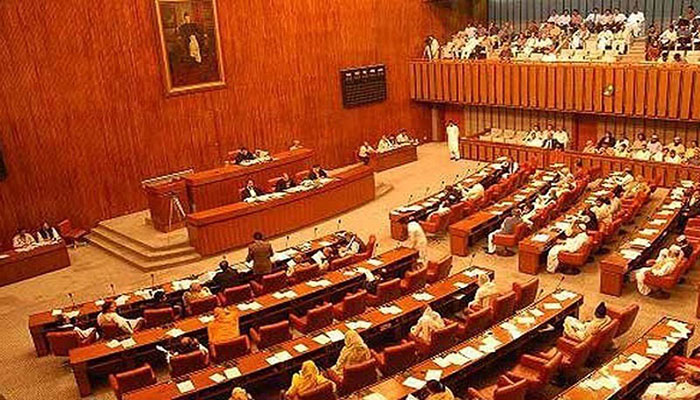Abolition of Fata seats: Senate’s numerical strength to be reduced due to tribal areas merger in KP
ISLAMABAD: The Senate, which presently comprises 104 members, will have its strength reduced by four after the forthcoming elections in March.
The vacancies created after the retirement of four senators who had been elected from Fata will not be filled. When the next polls will be held after three years in 2024, the Senate’s strength will be further cut by another four members. The Senate will ultimately comprise 96 senators. This will be the first time since its creation that the Senate’s strength will be reduced.
Since1985, the Federally Administered Tribal Areas (Fata) had been allocated eight Senate seats. In the past, Fata senators had always been elected by the 12 members of the National Assembly (MNAs) from the tribal belt. Thus, they had the smallest electoral college in the country. As a result, only very rich aspirants, who liberally threw around big money, had been winning Senate seats from the tribal areas.
After the merger with Khyber Pakhtunkhwa (KP) province, the tribal areas no longer enjoy a separate identity or enjoy separate representation in the Senate and National Assembly. That was done through a consensus constitutional amendment, which also increased the seats of the KP assembly accordingly.
The amendment had provided that the existing members of the Senate from Fata should be allowed to retire after completing their respective terms. Only after that would the upper house’s strength come down to 96.
As a result of this change, any party or coalition of parliamentary groups that will have in its basket 51 seats, will be in majority in the now 100-member Senate. The party or group will be able to elect its nominees as the chairman and deputy chairman and carry out legislation.
Since 1985, the eight Fata senators were always counted to be on the government’s side. The Fata group of Senators had been significantly boosting the numerical strength of the government in tight contests in the past. The case of the 12 Fata members of the National Assembly had traditionally been no different as far as their support to successive governments was concerned. But this trend changed after the members were elected on political party tickets in recent years.
Some parliamentary players want the Senate’s current strength of 104 to be maintained by equally apportioning the eight Fata seats among the provinces. This would naturally require a constitutional amendment for which there is currently little chance given the government-opposition tensions.
As things stand, even after the March elections to half of the Senate, no party or alliance would be in a position to secure a two-thirds majority in the upper house. Already no party or alliance enjoys such numerical strength in the National Assembly.
-
 Emily Ratajkowski Appears To Confirm Romance With Dua Lipa's Ex Romain Gavras
Emily Ratajkowski Appears To Confirm Romance With Dua Lipa's Ex Romain Gavras -
 Leighton Meester Breaks Silence On Viral Ariana Grande Interaction On Critics Choice Awards
Leighton Meester Breaks Silence On Viral Ariana Grande Interaction On Critics Choice Awards -
 Heavy Snowfall Disrupts Operations At Germany's Largest Airport
Heavy Snowfall Disrupts Operations At Germany's Largest Airport -
 Andrew Mountbatten Windsor Released Hours After Police Arrest
Andrew Mountbatten Windsor Released Hours After Police Arrest -
 Heidi Klum Eyes Spooky Season Anthem With Diplo After Being Dubbed 'Queen Of Halloween'
Heidi Klum Eyes Spooky Season Anthem With Diplo After Being Dubbed 'Queen Of Halloween' -
 King Charles Is In ‘unchartered Waters’ As Andrew Takes Family Down
King Charles Is In ‘unchartered Waters’ As Andrew Takes Family Down -
 Why Prince Harry, Meghan 'immensely' Feel 'relieved' Amid Andrew's Arrest?
Why Prince Harry, Meghan 'immensely' Feel 'relieved' Amid Andrew's Arrest? -
 Jennifer Aniston’s Boyfriend Jim Curtis Hints At Tensions At Home, Reveals Rules To Survive Fights
Jennifer Aniston’s Boyfriend Jim Curtis Hints At Tensions At Home, Reveals Rules To Survive Fights -
 Shamed Andrew ‘dismissive’ Act Towards Royal Butler Exposed
Shamed Andrew ‘dismissive’ Act Towards Royal Butler Exposed -
 Hailey Bieber Shares How She Protects Her Mental Health While Facing Endless Criticism
Hailey Bieber Shares How She Protects Her Mental Health While Facing Endless Criticism -
 Amanda Seyfried Shares Hilarious Reaction To Discovering Second Job On 'Housemaid': 'Didn’t Sign Up For That'
Amanda Seyfried Shares Hilarious Reaction To Discovering Second Job On 'Housemaid': 'Didn’t Sign Up For That' -
 Queen Elizabeth II Saw ‘qualities Of Future Queen’ In Kate Middleton
Queen Elizabeth II Saw ‘qualities Of Future Queen’ In Kate Middleton -
 Hilary Duff Reveals Deep Fear About Matthew Koma Marriage
Hilary Duff Reveals Deep Fear About Matthew Koma Marriage -
 Will Sarah Ferguson End Up In Police Questioning After Andrew’s Arrest? Barrister Answers
Will Sarah Ferguson End Up In Police Questioning After Andrew’s Arrest? Barrister Answers -
 Matthew McConaughey Gets Candid About AI Threat To Actors: 'Be Prepared'
Matthew McConaughey Gets Candid About AI Threat To Actors: 'Be Prepared' -
 Hailey Bieber Shares How 16-month-old Son Jack Blues Is Already Following In Justin Bieber's Footsteps
Hailey Bieber Shares How 16-month-old Son Jack Blues Is Already Following In Justin Bieber's Footsteps




